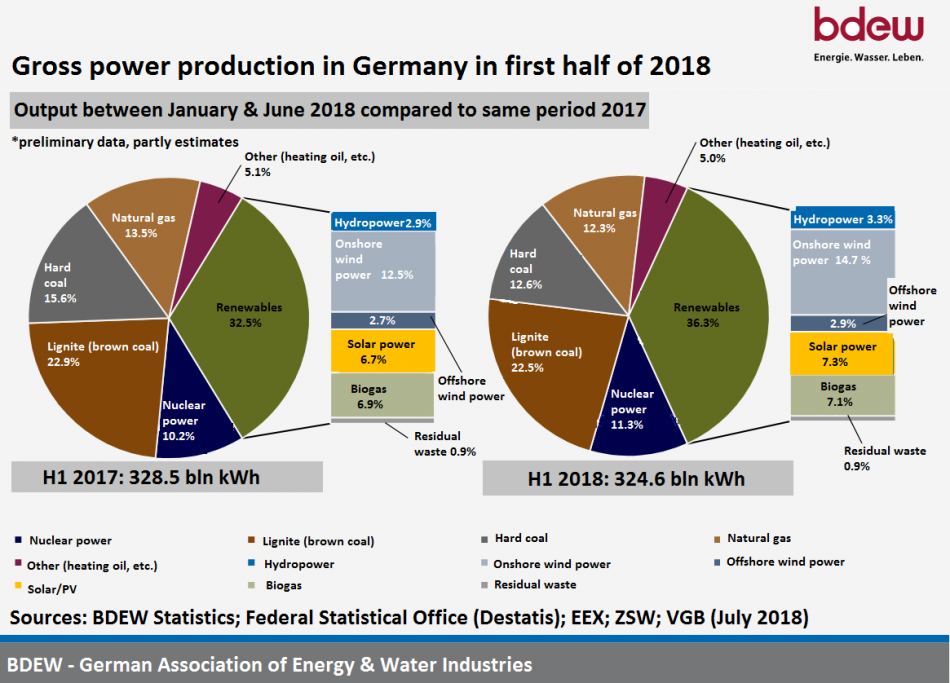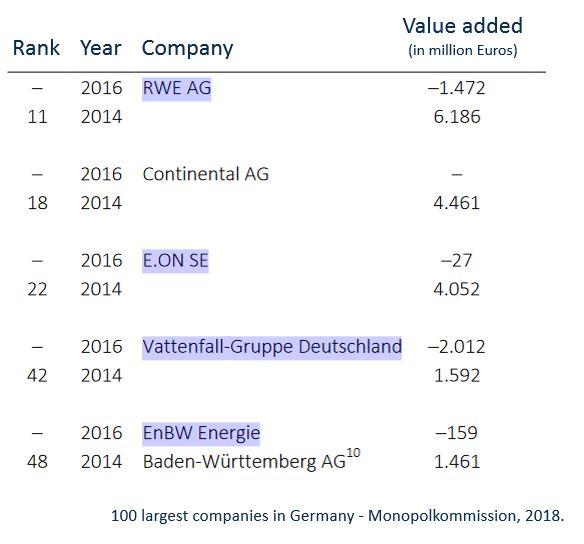Renewables overtake coal / Sino-German cooperation
German Association of Energy and Water Industries (BDEW)
For the first time ever, renewable energy sources in Germany have generated more power in the first half of 2018 than all coal plants taken together, making wind, solar, and other green energy sources the largest power source in the country, preliminary figures released by the German Association of Energy and Water Industries (BDEW) show. Renewable power sources together generated nearly 118 billion kilowatt hours (kWh) of electricity between January and the end of June, while the output of lignite and hard coal plants dropped to 114 billion kWh.
Find the press release in German here.
For background, read the articles Renewables overakte coal as Germany's most important power source and Renewables hit record as concerns over German govt quarrels grow.
German Government
The governments of China and Germany have vowed to intensify their joint efforts in global climate diplomacy and in upholding free trade, as well as in the development and rollout of energy transition technologies, the German government says in a press release. “We broke new ground,” German Chancellor Angela Merkel said after her meeting with Chinese Premier Li Keqiang in Berlin, adding that deals like the construction of a new battery cell factory by Chinese company CATL in Germany demonstrate the maturing economic cooperation between the two countries in electric mobility and other fields. In a joint declaration, the two governments said they will back the focus of this year’s G20 host Argentina on climate action, and will work to make progress on the Paris Agreement at the COP24 in Poland. “We stress the importance of robust rules as a foundation for trust between the signatory states,” the joint declaration said. Sino-German cooperation, dubbed a “responsible partnership for a better world” in the declaration, will also be strengthened in climate and energy research, energy efficiency, renewable technologies, and the development of a Chinese emissions trading system.
Find the declaration and the press release in German here.
See the CLEW articles Chinese-German battery cell deal key step for mobility transition and Sino-German tandem: Export champions promote global energy transition
Handelsblatt
During his official visit to Germany, Chinese Premier Li Keqiang signed a memorandum of understanding with Siemens CEO Joe Kaeser to cooperate on the development of large gas turbines, according to an article in the Handelsblatt. Siemens will support China in the areas of research and development, training, and technology consulting, so that China can, in the coming years, develop gas turbines itself. “Together, as partners, we can achieve great things for the Sino-German relationship,” Kaeser said.
Read the article in German here.
For background, read the factsheet Germany’s Siemens: a case study in Energiewende industry upheaval.
German Monopolies Commission
The “big four” utilities in Germany - RWE, E.ON, Vattenfall Germany, and EnBW - have all disappeared from a list of the country’s 100 largest companies compiled by the German Monopolies Commission, the competition watchdog says in its annual report. The list ranks companies according to their economic value added, the number of employees, and total sales volumes in 2016. While the big four utilities were still among the country’s top 50 companies in the 2014, they were all but gone from the top 100 two years later, the 2018 report says. “The Energiewende has caused major restructuring in these companies,” the monopolies commission writes. The split-off of subsidiaries at RWE, which used to be ranked 11th in 2014, and at E.ON, formerly 22nd, has significantly reduced both company’s individual economic weight and the “value correction” of their conventional energy generation capacities, the commission says.
Find the report in German here.
For background, read the dossiers Utilities and the energy transition, The energy transition's effects on the economy and the factsheet Germany’s largest utilities at a glance.
German Wind Energy Association (BWE)
Old wind turbines in Germany must be refurbished and modernised to ensure that the country meets its 2030 goal of increasing the share of renewables to 65 percent of power consumption, the German Wind Energy Association (BWE) says in a press release. The lobby group warns that 16 gigawatts (GW) of wind power capacity in Germany could be lost between 2021 and 2025 as the turbines will exceed their guaranteed 20-year operational life, and may not be operated at a profit any longer. “Based on current revenues, running costs allow us to continue operation only until the first major damage occurs,” BWE head Hermann Albers says.
Find the press release in German here.
For background, see the CLEW dossiers Onshore wind power in Germany and Offshore wind power in Germany.
Politico Europe
Once a leader on climate protection, Germany is now falling behind, former US Vice President Al Gore said in an interview with Politico Europe. Its continued reliance on coal to power its economy endangers not only its international reputation but also the jobs of the future, he added. “Germany was a model for the rest of the world, and a narrative took hold here in Germany that might be summarised as ‘Germany leads and everyone follows,” he told Politico. “But that narrative is now out of date.”
Read the article in English here.
For background, read the articles Gore says Germany faces historic step as coal commission starts work and Germany on track to widely miss 2020 climate target – government.
German Solar Industry Association (BSW)
The southern German federal state Hesse has become the third in the country to make its so-called “disadvantaged areas” available for solar fields, the German Solar Industry Association (BSW) has announced in a press release. Following in the footsteps of Bavaria and Baden-Württemberg, Hesse will sanction the construction of solar parks on low-yield agricultural land. The association expects further federal states to follow the three states’ lead. “For a successful regional structural change in the context of the coal exit, other federal states, such as North Rhine-Westphalia, Saxony, and Brandenburg, should move forward with siting for solar parks,” BSW head Carsten Körnig said.
Read the press release in German here.
For background, read the CLEW article How a Hessian county outpaces Germany's energy transition and the factsheet German federalism: In 16 states of mind over the Energiewende.
Westnetz
Smart distribution grids are a pre-requisite for the success of Germany’s transition to a low-carbon energy system, according to a press release from Westnetz, Germany’s largest distribution system operator. While Germany’s energy transition has been challenging thus far, the biggest obstacles still lie ahead, said Stefan Küppers, Westnetz’s managing director for digitalisation and special technology. “We have to rethink our energy system from scratch,” he said. “Future complexity in the energy system can only be solved by digitalisation.”
Read the press release in German here.
For background, read the dossiers The energy transition and Germany's power grid and The digitalisation of the Energiewende.



